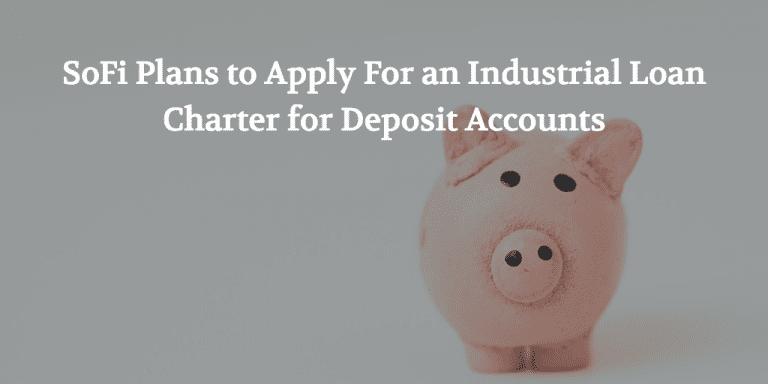
SoFi continues to set itself apart not just from traditional finance institutions such as big banks that it is looking to disrupt but also stands alone when you compare it to other fintechs. The company successfully invented the student loan refi business but has since expanded aggressively to other verticals. Their most recent aspiration is to take deposits. The acquisition of a digital bank Zenbanx set them on a path to do just that but there was still a question of how they would structure their offering.
Last week we learned in an article from TechCrunch that the company was pursuing an industrial loan company (ILC) charter. In that article, CEO Mike Cagney noted that Zenbanx’s banking stack de-risks the ILC application. SoFi will be applying for the ILC charter in the next month with aims to launch the deposit account later in the year.
What is an Industrial Loan Charter?
Since an industrial loan charter is not a familiar term we have done some research for you to provide some clarity and to understand why SoFi is pursuing this route. Only seven states allow industrial loan charters which are sometimes also known as industrial banks: California, Colorado, Minnesota, Indiana, Hawaii, Nevada and Utah with the vast majority of industrial banks headquartered in Utah.
An industrial bank is very similar to a commercial bank but they are allowed to be owned by regular businesses, like SoFi. Here are the main features of ILCs obtained from the Utah Department of Financial Institutions:
- eligible for FDIC insurance
- exempted from the technical definition of a “bank” for the purposes of the Bank Holding Company Act of 1956 (BHCA),
- otherwise generally subject to the same banking laws and regulations as other bank charter types.
While there are not many ILCs in existence today, the number is believed to be less than 30, there are some very well known brands. Here are some ILCs that are based in Utah:
- American Express Centurion Bank
- BMW Bank of North America, Inc.
- Sallie Mae Bank
- The Pitney Bowes Bank, Inc.
- UBS Bank USA
- WebBank
Many Lend Academy readers will recognize the name WebBank. They have been working with Lending Club and Prosper for many years. To this day most loans issued by these two platforms are actually originated by WebBank and sold on to Lending Club or Prosper investors after a short holding period.
Historically companies have leveraged ILCs to lend money for the financing parts of their business to in turn lend to consumers. For instance, a car company like BMW may seek an ILC for the financing arm of the business to make loans on their vehicles to consumers. But SoFi simply wants to offer deposit accounts to their customers and will not use it as a way to lend money.
Why SoFi Wants an ILC
The big carrot for SoFi and the main reason they are doing this is to obtain deposits. ILC deposits are insured by the FDIC and in order to accomplish this SoFi will need to get FDIC approval.
Cagney stated in the Techcrunch article from last week:
I think this is going to be the biggest challenge with the FDIC, and absolutely something the FDIC has to take into consideration.
SoFi want to become the only financial institution their customers need but to do that they have to be able to take deposits. Their customers need a place to deposit their paycheck and right now that money typically goes directly into a bank. SoFi can take the banks completely out of the equation by offering this deposit taking capability. This lack of a deposit taking feature is the main reason the OCC Fintech Charter is not very attractive to SoFi.
Conclusion
While SoFi plans to pursue this route as a way to offer deposit accounts it still remains to be seen whether they will be approved. No company has sought an ILC since 2009. A moratorium was placed on industrial bank charters coming out of the financial crisis which lasted until 2013. However if successful SoFi could be paving the pay for other fintech companies who want to offer similar services. If they aren’t successful Cagney still believes will be able to take take deposits without an ILC but that looks like a less preferable Plan B.


